Reading has always been important to me. Even before I knew how to read. My older brothers were readers and some of my earliest memories are of wistfully gazing at covers of old science fiction books and wishing that I could read them. I was a quick learner and I was reading well before my general age group.
Like most, I started out with childrens picture books. Dr. Seuss, Golden Books, various things from the elementary school library, Walt Disney comics, etc. I could start with those, but I’ll begin with what my kids used to call chapter books. Nothing was more enjoyable then laying in daybeds and reading as a kid.
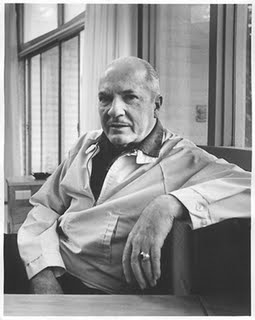 The first real writer I recognized as a favorite was Robert A. Heinlein. His books were real eye-openers for me and they remain among the most wonderful reading experiences of my life. My favorites were the ones written with teenage boys in mind for the audience. In fact I consider Have Space Suit, Will Travel to be the first real book I read. I treasure it to this day. I also adored Farmer in the Sky, Starman Jones, and Space Cadet, though I don’t recommend carrying books with these titles in school. Not if you want any kind of social life outside of being considered the Class Geek.
The first real writer I recognized as a favorite was Robert A. Heinlein. His books were real eye-openers for me and they remain among the most wonderful reading experiences of my life. My favorites were the ones written with teenage boys in mind for the audience. In fact I consider Have Space Suit, Will Travel to be the first real book I read. I treasure it to this day. I also adored Farmer in the Sky, Starman Jones, and Space Cadet, though I don’t recommend carrying books with these titles in school. Not if you want any kind of social life outside of being considered the Class Geek.
Other Heinlein books I cherished are The Puppet Masters and The Door Into Summer. His short stories are generally pretty awesome too.
I loved Heinlein’s later work when I was a kid: Stranger in a Strange Land, I Will Fear No Evil and Time Enough For Love. They were impressionable mainly because there was a lot of sex in them, but they had some pretty heady ideas in their pages too. As an adult I find these books to be a little too catty.
I’ll never forget my father chastising me for reading Robert A. Heinlein. With all the strength of ignorance on his side, he assured me that I was reading trash. I guess I turned out to be right, huh?
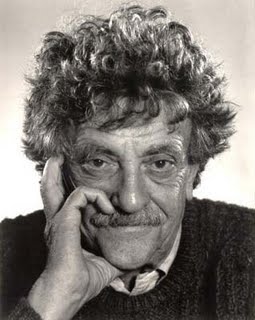 I read Kurt Vonnegut’s Slaughterhouse Five while I was in middle school. Again, it made an enormous impression upon me. I quickly read all of his books, including Breakfast of Champions. I’m not even sure I quite understood everything Vonnegut was trying to say in these books, but I knew that they were very funny, very entertaining, and that there were important ideas in them.
I read Kurt Vonnegut’s Slaughterhouse Five while I was in middle school. Again, it made an enormous impression upon me. I quickly read all of his books, including Breakfast of Champions. I’m not even sure I quite understood everything Vonnegut was trying to say in these books, but I knew that they were very funny, very entertaining, and that there were important ideas in them.
I can’t say that I disliked anything that came before and up to Breakfast of Champions, but of course I had my favorites. I was a science fiction fan and the ones I loved the most were The Sirens of Titan and Cat’s Cradle. I still think the latter would make an excellent movie in the proper cinematic hands.
I liked the first couple of post-Breakfast of Champions books, even while I felt that they weren’t as vital as the earlier ones. Slapstick was all right and Jailbird wasn’t a bad books. Something seemed to be missing though. Not one to give up hope, I made a rare hardcover purchase when Palm Sunday came out. I was burned. Even at the tender of twenty I thought Palm Sunday was unashamedly self-indulgent. I hated it and I never felt the same way about old Kurt again.
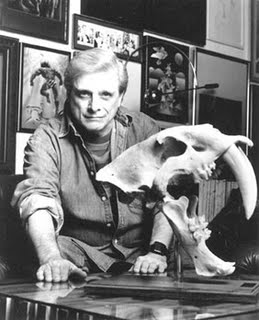 I had read Harlan Ellison years before I called him my favorite writer. I first encountered his work in a school anthology. The title of it now escapes me, but I never forgot the name Harlan Ellison. The story in question was called Silent in Gehenna. It was the best story in that anthology and one of the best short stories I had ever read. So when Pyramid Books began publishing its line of Harlan Ellison books in the 70’s, I bought every one I could. And I was never, ever disappointed.
I had read Harlan Ellison years before I called him my favorite writer. I first encountered his work in a school anthology. The title of it now escapes me, but I never forgot the name Harlan Ellison. The story in question was called Silent in Gehenna. It was the best story in that anthology and one of the best short stories I had ever read. So when Pyramid Books began publishing its line of Harlan Ellison books in the 70’s, I bought every one I could. And I was never, ever disappointed.
Ellison reminded me a bit of my previous favorite, Kurt Vonnegut, but Kurt started to seem like a cynical old fart and I found Ellison to be a more impassioned writer. Ellison gave a fuck and it showed in everything he did, from his fiction to his essays to his personal life.
I liked it all, but I was and probably still am partial to his nonfiction. I thought The Glass Teat was fantastic when I was in the tenth grade. I did a report on it that a teacher of mine didn’t particularly care for.
But God, the stories. So many classics: Shattered Like a Glass Goblin, Repent, Harlequin, Said the Ticktock Man, Pretty Maggie Moneyeyes, Jefty is Five, Daniel White for the Greater Good, A Boy and His Dog. The list is long and I could go on and on. But it was when I received the November, 1980 issue of Fantasy and Science Fiction that I discovered my very favorite work by Harlan Ellison. It is called All the Lies That Are My Life and it blew me away.
I continued to read Ellison and I’ve liked most of what I read. Now it has become impossible to separate the man from the work and sadly Ellison’s explosive personality has alienated him from the readers and the career that he should have had. I still love the guy and I check out what he has to say every chance I get.
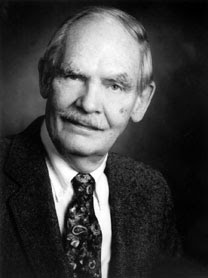 I never tired of Harlan Ellison, but I began to crave something different. Still a dyed-in-the-wool science fiction fan, I read as much of the field I could. Frederik Pohl was a prominent name in the genre. As the publicists love to say, Pohl has been everything in the science fiction world: Fan, writer, agent, editor.
I never tired of Harlan Ellison, but I began to crave something different. Still a dyed-in-the-wool science fiction fan, I read as much of the field I could. Frederik Pohl was a prominent name in the genre. As the publicists love to say, Pohl has been everything in the science fiction world: Fan, writer, agent, editor.
Frederik Pohl is widely known for his acidly satirical science fiction. He seemed to be as cynical as Vonnegut, but Pohl also loved space, while Vonnegut thought the whole space program was a colossal waste.
Pohl published dozens of stories and novels, often in collaboration with other science fiction writers. His most noted collaborations were with C. M. Kornbluth, who undoubtedly would have been one of the all-time greatest writers in the field if it hadn’t been for his untimely death in 1958.
Frederik Pohl always de
livered smart, wickedly entertaining fiction, but it was with 1976’s Man Plus that he really came into his own. This Nebula-winning novel was far and away superior to anything he had written before. Yet his following novel that brought him his biggest praise. Gateway is probably my favorite science fiction novel. The only real rival it has with me is Bester’s The Stars My Destination. Gateway not only won The Nebula Award, it won the Hugo Award, the Locus Award, and the John W. Campbell Award. All for best novel of the year. Gateway is the first in what became known as The Heechee Saga, which saw numerous sequels and a video game.
I read Pohl with wonder and awe, hunting down his old work and delighting in his new publications. After Gateway my favorites include The Cool War, The Space Merchants (with C.M. Kornbluth), JEM, and Starburst.
Pohl’s body is aged, but his mind is as sharp as ever, as you can see in his blog. At age 90, Frederik Pohl is almost certainly the Dean of Living Science Fiction Writers and he is one of the few surviving members of SF’s First Fandom.
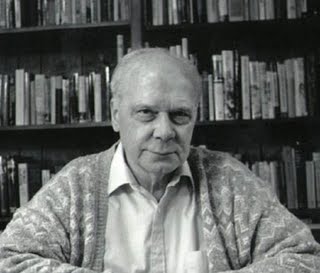 Philip José Farmer is known for bringing sex into the previously chaste world of science fiction publishing. His 1952 novella, The Lovers, dealt with a human that has a sexual relationship with an extraterrestrial. It was later expanded into a full-length novel.
Philip José Farmer is known for bringing sex into the previously chaste world of science fiction publishing. His 1952 novella, The Lovers, dealt with a human that has a sexual relationship with an extraterrestrial. It was later expanded into a full-length novel.
But Farmer wrote more than sex-based science fiction. He was kind of the mad literary prankster of the genre. He was doing what are now trendily called mash-ups long before most current practitioners were born. And unlike most, he had the literary props to pull it off.
Farmer loved to mix up his literary obsessions, and he always had explosive results. Like Doc Savage and Tarzan meeting in a wildly explicit novel. Or Tarzan of the Apes written by William Burroughs instead of Edgar Rice Burroughs. He wrote a book under the pseudonym of a Kurt Vonnegut character, which was the first one of his that really won my heart and made me a fan.
Philip José Farmer wrote experimental fiction, notably with Riders of the Purple Wage, which appeared in Harlan Ellison’s groundbreaking Dangerous Visions anthology. He wrote an Oz book. Farmer wrote a book that chronicled Doc Savage meeting his five aides with Escape From Loki. He did a science fictional sequel to Moby Dick called The Wind Whales of Ishmael.
But mostly Philip José Farmer wrote knockout books that alternately embraced and defied genre. Adventure, science fiction, hardboiled mystery, fantasy, erotica. It was and is impossible to pigeonhole Farmer. My own favorite of his works is called The Image of the Beast, which predated over-the-top, sexually explicit, hyperviolent horror stories by decades.
Still, I was looking for something else…
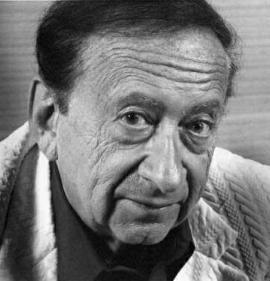 It is uncool and unfair to list two trailblazing talents like Richard Matheson and Robert Bloch together, but that’s really the way it was. I was a science fiction reader, remember? And the works by these two writers were most often found in the SF sections of bookstores.
It is uncool and unfair to list two trailblazing talents like Richard Matheson and Robert Bloch together, but that’s really the way it was. I was a science fiction reader, remember? And the works by these two writers were most often found in the SF sections of bookstores.
I was obviously looking for something darker in my reading. Most science fiction writers dabbled in the dark stuff in their careers, but these guys specialized in it. And they both worked extensively in the movies, which I thought was très cool.
I searched high and low for titles by these guys and it seemed that the used bookstores had scant copies of their books. I eventually found all or at least most of them and I had a blast with them all.
Matheson and Bloch had highly different styles. Bloch’s was more down-to-earth and Matheson’s was more literary. And to be honest, it was Richard Matheson that I loved more. Both were amazingly talented and I cherish the works of them both to this day.
I think I prefer Bloch’s short stories over his novels. Especially in the later periods of his life. Of course Yours Truly, Jack the Ripper is a certified classic, but I loved so many of them. Among my favorites are Beetles, The Movie People, I Do Not Love Thee, Dr. Fell, That Hellbound Train, Enoch, A Toy For Juliette, and The Man Who Collected Poe. Really, all of them are marvelous, even if some of Bloch’s humorous stories seem wildly dated today.
As for his novels, for me Bloch was more successful with straight suspense rather than supernatural horror. My favorite is easily The Scarf and I can’t imagine why some smart small press doesn’t do a nice edition of this one. I also loved Night-World, American Gothic, and of course, Psycho.
Robert Bloch’s work is typified by a delightfully ghoulish sense of humor. You’ll be hard pressed to find a more entertaining author anywhere.
Richard Matheson, on the other hand, dealt in weightier issues. His fiction delves into the very fabric of reality. His themes have included primal consciousness, our souls, the afterlife, and spiritualism.
Though he is primarily known for his fantasy, horror, and science fiction, Richard Matheson has also written comedy, westerns and a war novel.
Today, Matheson is probably best known as the author of I Am Legend, which was adapted into at least three films, none of which are truly worthy of his talent. His time-travel romance, Somewhere in Time, has earned him a considerable fanbase. Other films based on his work include The Legend of Hell House, What Dreams May Come, A Stir of Echoes, and most recently, The Box.
However, Richard Matheson is rever
ed by horror fans for his adaptations of Edgar Allen Poe stories for producer/director Roger Corman, his work on episodes of The Twilight Zone, The Night Stalker and The Night Strangler, and that horrifying Zuni Fetish Warrior Doll that terrorized Karen Black in Trilogy of Terror.
Richard Matheson is certainly one of the most remarkable writers of the last one hundred years and I expect readers and scholars to be discussing his work for decades to come.
Yet still I searched for more, even while the answer was right before my eyes.
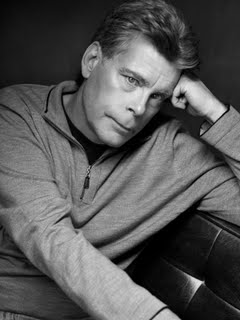 I knew about Stephen King in the early 80’s. Who didn’t? He was everywhere. A publishing phenomenon. Movies were constantly coming out based on his work and everybody was reading him. Everybody but me, that is. I assumed that he was a trashy bestseller and I thought myself too enlightened to read him. Boy, was I an idiot.
I knew about Stephen King in the early 80’s. Who didn’t? He was everywhere. A publishing phenomenon. Movies were constantly coming out based on his work and everybody was reading him. Everybody but me, that is. I assumed that he was a trashy bestseller and I thought myself too enlightened to read him. Boy, was I an idiot.
I took the plunge while visiting some friends. I was spending the night and it was late, but I wasn’t tired. A copy of The Shining was laying around and I picked it up. Instantly I was changed. From the first paragraph I read I considered myself a Stephen King fan. The style of The Shining was both literary and easily accessible. It almost seemed to me to be a radically new approach to writing.
From there I went on to read everything that King has published. This was at the time that Pet Semetery had just been published. I was blown away by them all. Of course I had my favorites; The Stand, Christine, Different Seasons, The Shining. And others that I felt were not his best, like Firestarter. But it’s safe to say that I enjoyed every word I read by him. I particularly liked the comfortable way in which he wrote essays, introductions, and other pieces of nonfiction. King made his readers feel like close friends.
My love affair with King’s writing culminated with It, a mammoth work that seemed to say everything he felt about childhood and fear. I flew through it at a frantic pace when it came out, but I reread it more carefully just this year and I still believe it to be among his finest novels.
Sadly, many of the post-It books were disappointments to me. I get no joy from saying that. Some, like The Tommyknockers, The Dark Half, and Needful Things were enjoyable enough, even if I felt that they were not up to the (high) standards of the earlier stuff. Others I didn’t like at all and we’ll leave it at that.
Oddly, the King books of the last twenty years that I loved the most seem to be the ones that most fans dislike: Gerald’s Game, Dolores Claybourne, From a Buick 8, and The Colorado Kid.
I’m happy to report that I recently finished King’s gargantuan Under the Dome, and I consider it to be one of his very best books ever.
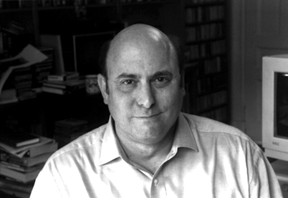 Through my love of Stephen King, I of course read Peter Straub and again, I was blown away. The quality of the writing was something I’d never quite experienced before.
Through my love of Stephen King, I of course read Peter Straub and again, I was blown away. The quality of the writing was something I’d never quite experienced before.
I started with Ghost Story and I immediately considered it to be the best horror novel I had ever read. The literary references made it fun, but it was also scary as hell.
After Ghost Story I read Shadowland and Floating Dragon, loving each one more than the one before. I’ve heard a lot of people complain about Floating Dragon, but at the time it was my favorite book. I loved the way Straub took a no-holds-barred approach to it.
I went back and read If You Could See Me Now. I don’t consider it to be his best novel, but something about it really appealed to me. I’ve read that one three times. I still say it would make a fantastic movie.
I read them all. Julia, which was his first horror novel, and I also read Marriages and Under Venus. Those last two were straight literary works and while they’re good, I think Peter Straub found his proper literary path in horror and suspense.
There was a five-year wait between Floating Dragon and Straub’s next novel, Koko. I bought Koko in hardcover and I read it, but I was slightly disappointed. I missed the fantastic elements of the previous books. Koko deals with the darkness inside men and it is one of the best serial killer novels ever written. I reread it this year and I appreciated it far more this time around.
Straub followed Koko with a series of novels and stories that dealt around a character named Tim Underhill, most notably in The Throat. After that he penned various novels and stories, some with supernatural elements, others without them. I liked them all, but…
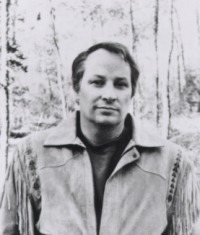 I had found another writer that took the top place on my list. His name is Joe R. Lansdale and before I had even read him, I had been hearing unanimous praise for his writing. I remember a three-book review in an old issue of Fangoria that was done by Stanley Wiater. I chalked Lansdale up as a writer that I needed to read. Then I saw an ad in The Twilight Zone Magazine for a book called The Drive-In. Obviously, this was a book I was born to read. I bought it that very week and I had a new favorite writer.
I had found another writer that took the top place on my list. His name is Joe R. Lansdale and before I had even read him, I had been hearing unanimous praise for his writing. I remember a three-book review in an old issue of Fangoria that was done by Stanley Wiater. I chalked Lansdale up as a writer that I needed to read. Then I saw an ad in The Twilight Zone Magazine for a book called The Drive-In. Obviously, this was a book I was born to read. I bought it that very week and I had a new favorite writer.
I’ve followed Joe’s career with enthusiasm ever since The Drive-In and I’ve rarely been disappointed. He wrote in nearly every conceivable genre, but I felt and still feel that Lansdale is strongest when he does straight suspense. Cold In July, The Bottoms, A Fine Dark Line, Waltz of Shadows, Leather Maiden, The Big Blow, and Sun
set and Sawdust are all amazing pieces of literature. And of course his Hap and Leonard books rank among the most entertaining novels I’ve ever read.
Lansdale writes like an early 20th Century rural storyteller spinning yarns from the back porch. His stories are uproarious and filled with all manner of sex and violence, but there is a righteous moral center to them.
Then there are his short stories. Lansdale’s most famous, or perhaps most notorious is a better way to put it, is undoubtedly Night They Missed the Horror Show. I have yet to see a reader come away from that one unaffected. Other outrageous short stories by Joe are Steppin’ Out Summer ‘68, By Bizarre Hands, Drive-In Date, and The Job.
Lansdale’s fiction has perhaps grown a tad more subtle as the years have gone by. He no longer seems to feel the need to slam the reader in the temple with a sledgehammer. This is not to say that Joe has grown soft or mellow. He still has the power to shock and unsettle his readers, but I think he uses more atmosphere and depth of character these days.
Yet, and again, this pains me to say, sometimes Joe goes so far out that I have a difficult time following. I’m talking about things like Zeppelins West and its sequel, Flaming London. The Drive-In sequels. Some of the short stories don’t do it for me either, like Bob the Dinosaur Goes To Disneyland and On the Far Side of the Cadillac Desert with Dead Folks. This sadly keeps Joe from the number one spot on my favorites list. Dubious honor that it may be.
I look back and I’m a little bit astonished that some writers whose work I love never made the list. I never called writers like Isaac Asimov, Clifford D. Simak, Arthur C. Clarke, Theodore Sturgeon, Philip Wylie, Fredric Brown, Robert McCammon, F. Paul Wilson, Thomas F. Monteleone, John Skipp/Craig Spector, Nancy A. Collins, Chet Williamson, Brian Keene, or even Douglas Preston and Lincoln Child my favorite writers. No matter how much I love these and dozens of other writers and their works.
Looking back at it all, there is one writer who has been the most consistent, who has constantly touched my heart and my mind. Book after book after book.
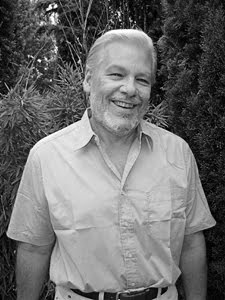 I lucked into reading Bill Pronzini early on. I saw a thriller that was written by Bill, in collaboration with a science fiction writer who wrote some books I liked: Barry Malzberg. The book was called The Running of Beasts and I consider it to have been far ahead of its time. The Running of Beasts (as well as another Pronzini/Malzberg book, Night Screams) is a serial killer story written long before the whole glut of them that came out in the wake of Thomas Harris’ success.
I lucked into reading Bill Pronzini early on. I saw a thriller that was written by Bill, in collaboration with a science fiction writer who wrote some books I liked: Barry Malzberg. The book was called The Running of Beasts and I consider it to have been far ahead of its time. The Running of Beasts (as well as another Pronzini/Malzberg book, Night Screams) is a serial killer story written long before the whole glut of them that came out in the wake of Thomas Harris’ success.
I read those and then I saw a solo book by Bill Pronzini. Lo and behold, it happened to be the first book in what would become the longest-running detective series in mystery fiction. I had no idea at the time how important that book, The Snatch, and the author, Bill Pronzini, would be to me. The Snatch is good, yes, but it was the seed that grew into the most satisfying series of books I would ever read in my life: The Nameless Detective books by Bill Pronzini.
The hook that Pronzini used was to never name the lead character of The Snatch. I don’t believe that he had any inkling how long this character would stay alive. To date there have been over thirty-five novels and a couple of collections of short stories that feature the character.
The ironic thing about The Nameless Detective is, readers have come to know so much about him. And eventually we got to know his first name, which bears a striking similarity to the author of the stories. We learned of Nameless’ loves, his fear. What makes him happy and causes him sorrow. Somehow Bill Pronzini has managed to keep this series, which has almost lasted four decades (!), fresh and credible. It seems impossible, but the last Nameless book, Schemers, is one of the most gripping of them all.
Pronzini has alternated the Nameless books with stand-alone novels, and though he is widely known as a mystery writer, Bill has written horror and western fiction too. As with the Nameless series, the other books continue to grow and his skills have grown as the decades have passed. I cannot say the same about a lot of other writers.
My favorite of all Bill Pronzini’s books is probably The Crimes of Jordan Wise, which in many ways is atypical of his work. It isn’t as hardboiled as the majority of his books, but it has a wonderful setting and some of Bill’s best characters.
What makes the fiction of Bill Pronzini so special to me is the sheer humanity in it. The themes in his stories are universal ones. Ones that pertain to not only my life, but everyone’s. There is joy and hope, fear and courage, strength and weakness, humor and horror.
Will another writer ever take the place of Bill Pronzini as my favorite? Anything’s possible, but it seems highly improbable. It’s not likely that any writer can top the joy that Pronzini has given me for the past few decades. Still, we never know what the future will bring. That’s the beauty of it.
No comments